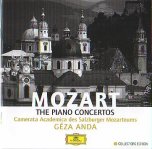Géza Anda set down his cycle of Mozart piano concertos, in which he also directed the Camerata Academica of the Salzburg Mozarteum, in the years 1961 and 1969. That his survey seldom has been out of the catalog in the intervening years attests eloquently enough to its qualities, and DG’s decision to reissue the performances as part of its mid-priced Collectors Edition series will be warmly welcomed. If you’ve heard all or part of the set in previous CD issues, the first thing you’ll notice about these newly-reprocessed transfers is how much finer they sound. Gone is the formerly rather astringent and brittle piano timbre, along with the shrill-sounding violins and tart woodwinds that often made hard listening of these exceptionally lucid and musically satisfying accounts. Tape hiss, too, has been effectively minimized, and “Original Image Bit Processing” also has given the performances a new dimension of spatial realism, so that you really do sense that the three recording locations employed (Salzburg’s historic Mozarteum and the large and small Festpielhaus) have markedly differing acoustic properties and dimensions.
As to the performances, Géza Anda was a thoughtful and scholarly Mozartian, and indeed, this ground-breaking series established standards for “modern” Mozart concerto interpretation, laying down a path that Brendel, Perahia, and to a lesser degree Schiff have pursued. For reasons of practicality, these eight individual CDs do not provide for the concertos to be organized numerically, so you’ll find No. 2 in B-flat K. 39 following No. 14 in E-flat K. 449 at the end of Disc 2. And it’s unfortunate that No. 1 in F K. 37 is heard as part of Disc 5, following hard on the heels of masterpieces like No. 20 in D minor K. 466 and No. 21 in C K. 467, the so-called “Elvira Madigan” concerto, but this is a small inconvenience when this set gives you the chance to acquire these classic performances at minimal cost.
To cite a few obvious highlights from the cycle is already disingenuous since it is superb overall. However, Anda plays the early concertos, Nos. 1-5, with a seriousness of purpose that raised them to a higher plane of interest, and his own cadenzas, elegant and shapely creations, always have proper thematic relevance to the music–something you can’t always take for granted. Of the middle period works, the readings of concertos Nos. 14 in E-flat K. 449 (how skilfully Anda manages the coda of the rondo finale, where the note values are suddenly halved) and 17 in G K. 453, deserve mention, and the variation finale of the G major work is brilliantly done. Both minor key works, Nos. 20 and 24, have utmost gravitas, and Anda brings uncommon insight to the sublime valedictory utterances of No. 27 in B-flat K. 595. In sum, this set is an exceptional bargain, and Anda’s authoritative performances remain highly competitive in an increasingly crowded field.
































